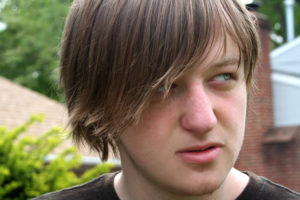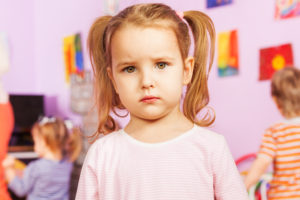
Why Do Children Lie and What Can We Do?
Research by Dr. Victoria Talwar, of McGill University, Montreal, Quebec, has found that most parents don’t think their children lie but they do! The statistics are high… 96% of children lie!
She found that reading the popular fable, The Boy Who Cried Wolf, to children, further discouraged them from telling the truth. They focused on the fact that the boy was severely punished for losing all his sheep and angering the villagers, and therefore, they would rather lie than suffer these negative consequences.
Dr. Talwar is one of the world’s leading experts on lying behaviour in children. She has discovered, through her live experiments, that although parents think they know when their child is lying to them, they usually don’t. Many parents don’t believe their child would lie but the experiments at her lab tell a consistently different story.
She runs a “peeking experiment” and has discovered that when asked not to peek at a toy, when the researcher goes out of the room, one third of the three year olds will peek, but when asked, will admit to peeking. Whereas, 80% of the four year olds will peek, and when asked about it, 80% of that group will lie about peeking.
- By age four, most kids start experimenting with lying and for children with older siblings, they start younger!
Why Do Children Usually Lie?
To cover up that they’ve done something wrong and avoid punishment.
To gain power and have control.
What Do Parents Usually Do?
They usually address the problem that occurred but don’t address the actual lying behaviour because they think it’s “normal” for the child to lie to cover up.
Talwar has discovered children will continue to lie if it becomes a habit and works for them.
Talwar states the lying is a complex skill that requires advanced cognitive and social skills, but it still needs to be addressed.
Five Reasons Children Lie
- To keep themselves out of trouble/punishment because they know they’ve done something wrong
- As they develop greater empathy, to prevent hurting a friend’s feelings
- As they develop, lying becomes equated with increased power – by teasing friends, bragging to show off one’s status, and by fooling one’s parents*
- To gain attention, over-compensate, and navigate challenging social situations
- And…children learn to lie from us!
*For more information on how our behaviour as parents creates “misbehaviour” in our children, read my previous post: Are You Inadvertently Reinforcing Your Child’s “Misbehaviour”?
96% of Children Lie!
How Do They Learn From Us?
➢ We teach children to smile and say “thank you” for gifts that they don’t like
➢ We lie to avoid socially awkward moments
➢ We lie to make others feel good
➢ We break promises or commitments
➢ We tell “white lies”
➢ We lie to avoid conflict
➢ We lie to pretend everything is better than it really is
➢ We discourage tattling, even though research has discovered, this is usually when they are telling the truth!
How Can We Encourage Truth-Telling Behaviour?
- We need to model telling the truth
- We need to call children on their lying behaviour, and not let it slide
- We need to help children feel connected, capable and empowered without having to lie about themselves
- We need to hold children accountable for their lying behaviour, and explain that the size of a problem gets smaller when they tell the truth and we feel happier
- We need to help our children understand that trust is like a bridge between two people that creates a strong connection. If a child lies to us, it is as though the bridge has crumbled and now it takes time to rebuild the bridge of trust
- We need to explain that greater trust means greater freedom for them . (“With responsibility comes freedom” ~ Eleanor Roosevelt)
- We need to be careful not to punish our children if they do tell us the truth, or next time they will try to be sneaky or lie better
- We do need to set limits. If they have done something wrong and they honestly admit this to us, they still need to do “repair” for the physical or emotional damage that has been done. Ask them for ideas as to how they can do “repair” so they take greater ownership of the problem
- We need to practice “Collaboration = Cooperation”. If we set external rules that our child does not respect or agree with, there will a greater tendency for our child to be sneaky and lie. When we set rules, we need to do so in conjunction with our child. We are still holding our “Alpha” position by setting the stage for parameters, but by including our child, there will be more ownership and follow-through.
Why Doesn’t Reading “The Boy Who Cried Wolf” Help?
Talwar’s research has found that reading stories such as The Boy Who Cried Wolf, don’t help because the boy gets severely punished for lying and this is a deterrent.
However, the fable about George Washington and the Cherry Tree, reduced lying in boys by 75% and in girls by 50%! The moral here is… CONNECTION.
This story focuses on there being no punishment and on how grateful the father is that his son told him the truth. He says “George, I’m glad that you cut down the cherry tree after all. Hearing you tell the truth is better than if I had a thousand cherry trees.”
The Key Point: George feels safe to tell his father the truth.
As always, it’s important to look at our behaviour as parents, to see how it’s impacting our children’s behaviour.
Have a wonderful week,
Warmly,
Sharon
PS. Registration is open for my next round of Brain Science – Anxiety Management Groups for 7-9 year olds and 10-12 year olds, starting Thursday, May 3rd 2018. You can learn more about these groups and register online here. (Click on “upcoming groups/events” and scroll down to find the right age group for your child.)
PPS. The WVSD DPAC is bringing the documentary, ANGST – Raising Awareness Around Anxiety to the Kay Meek Theatre in West Vancouver on Wednesday, April 25th from 7-9pm. Tickets available at www.kaymeekcentre.com This event is open to the public and tickets are $10. I’m looking forward to being on the panel as part of a post film debrief right after the documentary. To read my summary/review about the documentary ANGST click here.
PPPS. Letitia Lipp, a wonderful Certified Parent Facilitator from the Adler Centre, Vancouver is starting a parenting group in West Vancouver. Tuesdays 7-9pm May 1, 8, 15, 22, 29, June 5, 12, 19 at Docs on The Bay (Horseshoe Bay), 6422 Bay Street, W. Vancouver. Cost: Individual $200, Couples $300 . Registration Required through the Adler Centre. apabc@adler.bc.ca or tel. 604-742-1818
Want to Connect?
Subscribe now to receive free weekly parenting tips and inspiration.







